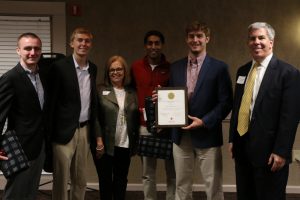First awarded in 2009, the McKee Scholarship program is available thanks to the generosity of the late Hensel McKee, Washington ’30 and his wife Jeanette McKee. The Scholarship is available to undergraduate members and alumni members who are pursuing graduate degrees. To be eligible, applicants must have a cumulative grade point average of at least 3.0 on a 4.0 scale, be initiated members of Delta Sigma Phi Fraternity in good standing, and be enrolled at a college or university during the academic term.
We are please to announce this year’s recipients:
The Better Man
$10,000 each for men who are a well-rounded embodiment of Delta Sigma Phi values.
Quinton Berkompas, Washington State University ‘17
Tristan Ott, Missouri University of Science and Technology ‘17
Brett Seidl, Kansas State University ‘10
Men of Courage
$2,500 each for men who exhibit exceptional leadership.
David Adams, Albion College ‘19
Elliott Beach, Thiel College ‘12
Paul Chung, The University of California, Los Angeles ‘18
Elias Hanna, Transylvania University ‘14
Szymon Kamiński, The University of Illinois at Urbana-Champaign ‘16
Mason Lovell, The Ohio State University ‘19
Jeffrey Marshall, The University of Texas at Austin ‘19
Jake Moore, Virginia Polytechnic Institute & State University ‘18
Joel Revo, The University of Michigan ‘17
Garrett Riou, The University of Texas at Austin ‘10
Christian Suero, Michigan State University ‘10
Michael Woller, Utah State University ‘18
Men of Action
$2,500 each for men who have committed themselves to outstanding service to their communities.
Adam Boro, University of Maryland ‘17
Daniel Cooper, Transylvania University ‘16
Neal Eller, Kansas State University ‘17
Jacob Forbes, Washington State University ‘17
Noah Huehnergarth, The Pennsylvania State University ‘18
Kyle Huffman, The Ohio State University ‘18
David McGrath, Case Western Reserve University ‘17
Ethan Santoni-Colvin, The University of Texas at Austin ‘19
Jason Semaya, The University of Michigan ‘18
Ravi Shastri, Missouri University of Science and Technology ‘18
Jonathan Staley, Indiana State University ‘17
Alberto Tueme, The University of Texas at Austin ‘14
Max Vorcheimer, The University of Michigan ‘17
Men of Excellence
$2,500 each for men who have demonstrated exceptional academic performance.
Harrison Fields, University of Kentucky ‘18
Scott Fletcher, Utah State University ‘08
Gavin Husted, Shorter University ‘18
Nicholas Killian, Eastern Michigan University ‘18
Austin Lamb, Transylvania University ‘18
Reed Marquardt, The Ohio State University ‘19
Rishabh Mazmudar, Case Western Reserve University ‘14
Luke Prohaska, Kansas State University ‘18
Trevor South, University of Kentucky ‘18
Franklin Wang, The Ohio State University ‘17
Tommy Weinstein, University of Michigan ‘18
Yanshuo Zhang, Missouri University of Science and Technology ‘18
Sphinx Scholarship
$2,500 each for graduate students of distinction.
Samuel Finn, University of Michigan ‘15
Michael Fritz, University of Kentucky ‘14
Tom Gallery, Rose-Hulman Institute of Technology ‘16
J.T. Henderson, Transylvania University ‘15
Kollin Michels, University of Wisconsin – Eau Claire ‘13
Justin Miller, New Mexico State University ‘94
Brenton Novit, The University of Texas at Austin ’15
Michael Rafo, Eastern Michigan University ‘15
Suraj Rama, University of Kentucky ‘13
Christian Soares, University of Kentucky ‘13
Mark Solinski, Loyola University Chicago ‘13
Lloyd Taylor, The Ohio State University ‘12
Nile Scholarship
$500 each for undergraduate men exhibiting exceptional leadership and values.
James Barr, The University of Texas at Austin ‘18
Matthew Benge, The Ohio State University ‘18
Adam Brzyski, Missouri University of Science and Technology ‘18
Cody Dorman, University of Northern Colorado ‘16
Allen Fooks, University of Pittsburgh ‘18
Matthew Greenway, The University of Georgia ‘18
Justin Groshek, Gannon University ‘18
Victor Guardiola, The University of Texas at Austin ‘19
Curtis Harryman, Iowa State University ‘16
Zachary Lewis, Missouri University of Science and Technology ‘16
Isaac Narrett, The University of Michigan ‘17
Jacob O’Rourke, University of Central Florida ‘16
Sahil Prabhudesai, South Dakota School of Mines and Technology ‘16
Ari Rand, Loyola University Chicago ‘19
John Sykes, University of Florida ‘18
Charlie Story, Chapman University ‘18
Matthew Waigand, Shorter University ‘18
Cole Walter, Duke University ‘18
Kawai’ola Wong, Millikin University ‘18
Alexander Wood, University of Missouri of Science and Technology ‘18

